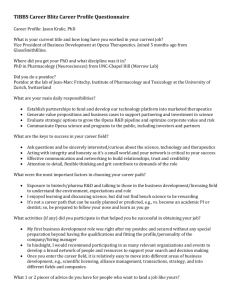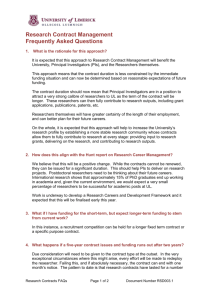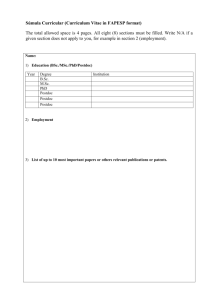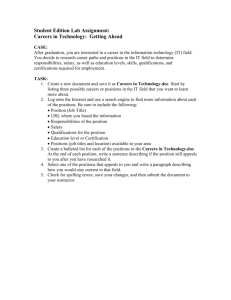Creating sustainable research careers
advertisement
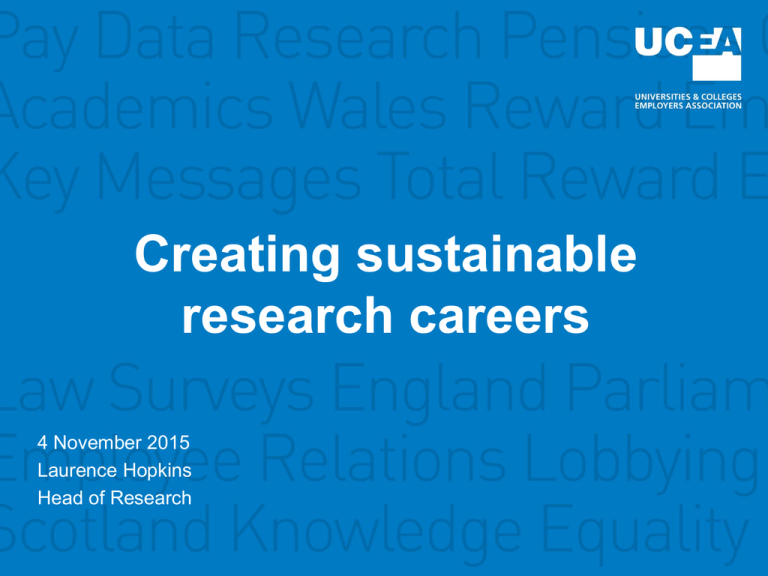
Creating sustainable research careers 4 November 2015 Laurence Hopkins Head of Research What is sustainability? What is a research career? Research career or research contract? Increase in academic staff, by contract, 2009-10 to 2013-14 16.0% 90% 14.2% 80% 14.0% 80% 70% Staff growth 60% 10.0% % with salary over £42,500 50% 8.0% 40% 6.0% 30% 4.0% 19% 20% 2.5% 2.0% 10% 0.0% 0% Research only Teaching and research % with salary over £42,500 % increase in staff 12.0% Research career or research contract? Temporary researcher contracts in Italy, 2004-2013 35 – average age 3500 2871 3000 6.2 – average number of research contracts 2406 2500 10.4% have had between 13 and 30 temporary contracts 2000 1602 1 in 3 working outside HE don’t use professional skills acquired during PhD and postdoc 1500 1160 1000 643 466 500 6 23 126 53% ‘can’t imagine their professional future’ 271 0 2004 2005 2006 2007 2008 2009 2010 2011 2012 2013 Source: FLC CGIL (Italian trade union for academic staff) RTD Statali RTD Non Statali Totale Research career or research contract? Academic staff in Australia by function and contract type (%), 2012 T&R 74% RO 25% 12% TO 85% 9% 0% 1% 10% 10% 3% 80% 20% 30% 40% Ongoing 50% Fixed term 60% 70% 80% Actual Casual Source: AHEIA, 2014. T&R = teaching and research. RO = research only. TO = teaching only 90% 100% Research career or research contract? Academic staff by contract level, Germany, England and USA 100% 75% 74% Full professor Associate professor/senior lecturer 50% Junior professor/lecturer/assistant professor Assisting staff with permanent contracts Assisting staff with temporary contracts 25% 28% 17% 0% Germany 2009 England 2009 USA 2010 Source: http://www.gew.de/Binaries/Binary65439/WiKo10_Reinhardt_Kreckel.pdf Research career or research contract? Degree of satisfaction with different aspects of the current academic position per current career stage (EU27) Source: MORE2 Higher Education Survey (2012). Based on European Framework for Research Career classification Aspects of current academic position R1 (PhD) R2 (Postdoc or equiv.) R3 (Associate professor or equiv.) R4 (Professor or equiv.) Average Intellectual challenge 94 92 93 95 93 Job location 90 92 89 89 90 Level of responsibility 89 85 87 93 89 Reputation of employer 91 90 87 87 88 Degree of independence 89 78 87 92 87 Contribution to society 80 81 87 90 85 Dynamism 86 82 84 88 85 Social status 78 78 80 84 80 Job security 62 57 75 89 73 Mobility perspectives 70 65 59 66 64 Opportunities for advancement 66 55 60 67 62 Benefits 54 55 52 53 53 Salary 59 49 52 54 53 Average 77 74 76 81 77 Are we producing too many PhDs? • European Science Foundation - The oversupply of PhD holders in Europe is causing ‘considerable dissatisfaction and stress’ for researchers on temporary contracts – the current situation is ‘not sustainable’ • According to Eurostat there were 747,267 doctoral candidates in 2012 compared to just over 500,000 in 2006 - an increase of 46% • The MORE2 survey found that between 68% (Germany) and 83% (Croatia) of PhD graduates wanted a research career in academia across a selection of 12 member states. • National Academy of Sciences report (US) – reduce numbers, make graduate students aware of job market, raise starting salaries and limit postdoc service to 5 years • Interviewees in all of our six case study countries reported a large mismatch between the supply of postdocs, postdoc expectations, and the number of opportunities in higher education. Do we focus too much on the supply side? Business sector researchers per 1,000 labour force 9 8 7.4 7.63 7 6 5 4 3 2.98 2 1.38 1 0 All EU Source: Deloitte, 2013 US Japan China Do we focus too much on the supply side? 400 350 Researchers (thousands, FTE) 300 Higher education sector Government sector Business enterprise sector 250 200 150 100 50 0 Cyprus Finland Germany Italy Romania UK Recommendations from our report • Review contract arrangements for researchers (including impact on research quality) • Manage researcher expectations with better data on careers • Ensure appropriate balance between research duties and teaching/tutoring/admin for ECRs • Improve the status of research staff - formally recognise all contributions • Establish platforms for dialogue about research careers with social partners Final thoughts • Do we want HE research (only) careers that are distinct from academic (T&R) careers? • Global issues – global solutions? European solutions? • What can we do as a sector, as organisations and as individuals to stimulate the demand side for highlevel skills? • Is our approach to PhD education too laissez-faire or is this a strength? • Are we attracting and retaining the best and the brightest? How can we measure this?
